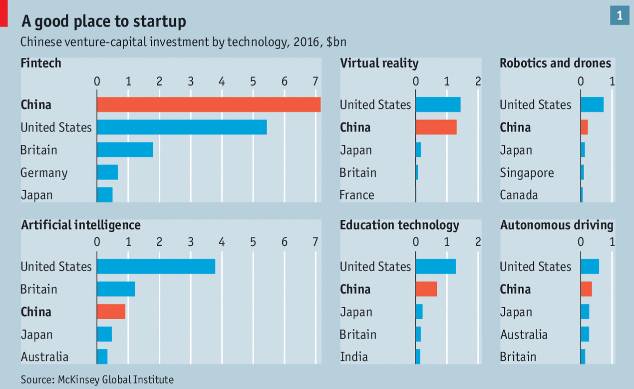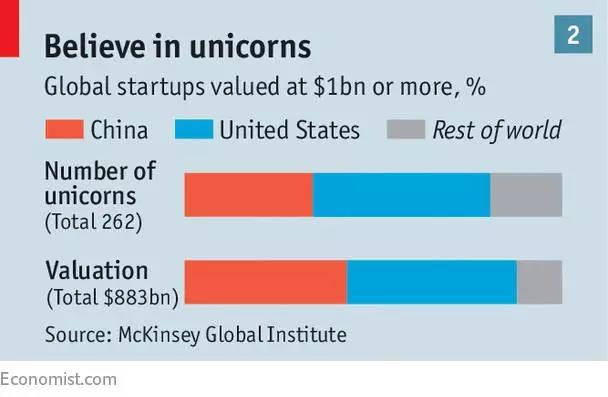
Sep 23rd 2017 | SHEKOU | The Economist
Industries and consumers around the world will soon feel their impact
“NEW era, new revolution. I am a MAKER, for the hearts of the dream.” So goes a rallying cry carved in giant letters on the wall of a warehouse in Shekou, a seaside enclave near Hong Kong. Many of China’s most promising entrepreneurs flocked there recently for a conference organised by TechCrunch, a technology publisher from Silicon Valley. Yet Baidu, Alibaba and Tencent—established Chinese internet giants collectively known as the BAT—were overshadowed by upstarts such as Didi Chuxing, a ride-hailing firm that chased America’s Uber away from China, and Ofo, a bike-sharing startup that is going global.

They are part of a new wave of inventive young firms emerging from China. A few years ago, Chinese innovation meant copycats and counterfeits. The driving force is now an audacious, talented and globally minded generation of entrepreneurs. Investors are placing big bets on them. Around $77bn of venture-capital (VC) investment poured into Chinese firms from 2014 to 2016, up from $12bn between 2011 and 2013. Last year China led the world in financial-technology investments and is closing on America, the global pacesetter, in other sectors (see chart 1).
China’s 89 unicorns (startups valued at $1bn or more) are worth over $350bn, by one recent estimate, approaching the combined valuation of America’s (see chart 2). And to victors go great spoils. There are 609 billionaires in China compared with 552 in America.

“Innovation moves faster here,” insists Kai-Fu Lee, a former head of Google’s Chinese operations who now runs Sinovation Ventures, a VC fund and accelerator in Beijing. Gone are the “C2C” (copy to China) and “JGE” (just good enough) strategies of their parochial predecessors. China’s nimble new innovators are using world-class technologies from supercomputing to gene editing. Having established themselves in the cut-throat mainland market, many are heading abroad.
There are three main reasons why China’s determined entrepreneurs can expand their businesses rapidly. First, the economy, the world’s second largest, is big enough to let firms attain huge scale just by succeeding at home. It helps that language and culture are more homogeneous than in Europe and physical infrastructure (such as roads and wireless broadband) is new and excellent, unlike in America.
Second, Chinese shoppers are voracious and venturesome, an advantage to innovators with clever products but unfamiliar brands. They are also unusually eager to embrace technology. China’s penetration rates for mobile phones and broadband internet are high, making it easy for startups to reach a vast market cheaply. And China is rapidly becoming cashless. The volume of mobile payments shot up almost fourfold last year, to $8.6trn, compared with just $112bn in America. This is why China breeds financial-technology startups so quickly and is home to many of the world’s most valuable fintech firms. Ant Financial, spun out of Alibaba, may be worth more than $60bn.
Third, state-dominated industries ranging from telecommunications and banking to health care are woefully inefficient and even hostile to consumers. This allows agile newcomers, with business models that put the customer first and deploy the latest technologies, to jump ahead of incumbents more easily in China than their counterparts in developed markets.
Moving at China speed
The government’s inability to run industries well is counterbalanced by a willingness to support new ventures, which in turn hastens innovation in areas such as transport. David Frey of KPMG, a consultancy, believes that it has played a useful role as a “market-maker”, one reason why China is far ahead of America in both electric-vehicle (EV) registrations and the number of charging facilities. A recent announcement of an eventual ban on petrol engines (probably after 2030) could help to secure a long-term lead in the global EV market. But the most useful change was a decision to allow venture-backed startups without previous carmaking experience to enter a field previously dominated by inept firms cranking out subpar EVs.
Consider Nio, a three-year-old automotive company. Its headquarters and research centre are tucked away in a huge complex of low-rise buildings in Shanghai’s Jiading district, a cluster that aspires to become the Detroit of China. It is the brainchild of Li Bin, one of China’s most formidable serial entrepreneurs. He made a fortune through BitAuto, a pioneering online platform for buying and selling cars. He also conceived and launched Mobike, Ofo’s main rival in the booming bike-sharing market, and is still its chairman. Nio, backed by the country’s most astute early-stage investors, including China’s Hillhouse Capital and America’s Sequoia Capital, is valued at around $3bn.
Leaping to a whiteboard, Mr Li calculates that the impact China’s cars have had on the planet over the past decade equals that of all cars in the previous 100 years. “From 2000 to 2017,” he adds, sketching a declining curve, “there was diminishing happiness from owning a car.” Traffic, pollution and accidents were to blame. So too, he adds, is a car industry locked into “a 100-year-old way of doing business”.
Driven by innovation
His solution has three pillars. The first is to combine cloud computing, artificial intelligence and sensing technologies to advance autonomous driving. This will not end traffic jams, he reckons, but it can bestow on erstwhile drivers the gift of free time in their cars. Nio has unveiled Eve, a concept vehicle that is in effect an AI-powered living room on wheels. The second pillar is to speed up electrification. To augment the roll-out of conventional chargers, he will offer rapid battery swapping in big cities. The third, and one in which he thinks startups have the edge, is to design cars specifically for the digital era.
The firm has developed much of its technology in-house. It employs people from 40 countries, some poached from established carmakers including Ford and Volkswagen. Last November, Nio presented its first vehicle at a glitzy event at the Saatchi Gallery in London. The EP9, which holds the world speed record for EVs, is designed to wow critics and show off technological prowess, not for mass-market sales. That will come in time, says Mr Li.
Over the next decade, he sees sales rising to the millions, half outside China. Nio has an affiliate in Silicon Valley headed by Padmasree Warrior, a former chief technology officer of Cisco, which plans to raise funds as an independent entity this year. “We consider ourselves a global startup because we want to solve global problems,” Mr Li reflects. As for rivals, he is confident that “Nio can do much better than Tesla.”
Venturesome consumers also play a role in fostering innovation. The Chinese are keen to try new products and are more forgiving than Westerners if they are not perfect. Deprived of consumer goods and luxuries for many years, they are eager to experiment. Wealthy Chinese are younger (typical Audi buyers in Germany are in their 50s; in China they are in their 30s), and hence more familiar with technology. Because the car is not a cherished cultural icon as it is in America, locals are not addicted to driving and are open to alternative forms of mobility such as ride-sharing.
That has been a boon to Didi. With a reported valuation of $50bn, it is the world’s most valuable startup after Uber. This is thanks to an injection earlier this year of $5.5bn, the biggest-ever funding round for a young tech firm, by a group led by Japan’s SoftBank. Didi’s other investors include all the BAT companies, as well as Apple. Didi is far more than a smartphone app for hailing cars, explains Connie Chan of Andreessen Horowitz, an American VC firm. The willingness of local consumers to experiment has helped shape its business model.
Didi runs car pools, minibuses and buses in addition to taxis and luxury cars. It has services for the elderly and can send a driver to take you home in your own car. The firm provides about 20m rides a day in China, several times the number managed by Uber worldwide. Didi hopes to use AI to predict a customer’s transport needs, be that for cars, public transport or bicycles. Its platform offers 200,000 EVs, a figure set to rise to 1m within a few years, and it plans to promote autonomous cars heavily.
“We’re definitely going global,” declares Jean Liu, Didi’s president. Her firm owns stakes in ride-hailing services worldwide, from India’s Ola and South-East Asia’s Grab to Brazil’s 99 and America’s Lyft. In July Didi and SoftBank ploughed $2bn into Grab. In August the Chinese upstart invested in two Uber clones, Estonia’s Taxify, which serves Europe and Africa, and Dubai’s Careem, which operates in the Middle East. It does not lack ambition: “In the next five years, Didi will grow beyond a mobility service to become the world’s leading automotive network operator and a leader in new transportation technologies,” the firm claims.
Didi’s success shows how local companies can cause global disruptions with sharing-economy services road-tested in China. The country’s urbanites already use smartphones to rent umbrellas, mobile-phone chargers, basketballs and other necessities for a small fee. The firms behind such services are pioneering the use of micropayments and credit verification using analysis of social media.
Accelerating the business cycle
The battle of the bikes is the most closely fought of China’s sharing-economy wars. Ofo and Mobike, rival bike-sharing unicorns worth about $3bn each, have redesigned the humble two-wheeler to be an intelligent, cloud-connected device. China’s big cities are awash with brightly coloured bikes from a rainbow of competitors. Because tracking technology removes the need for dedicated docks, they can be picked up and dropped off anywhere. This convenience creates new problems to solve. Ofo is pioneering a credit-scoring system that rewards well-behaved users and punishes naughty ones, such as those who park in the middle of roads.
Dai Wei, Ofo’s boss, explains that his firm’s rapid rise builds on the explosive growth in smartphones, mobile payments and the internet of things in China. Just three years ago, Ofo’s founders were poor students in Beijing, frustrated that their bikes were often stolen. They now control 8m bikes and provide over 25m rides a day in America, Singapore and Britain as well as China, and expect to operate in 200 cities in 20 countries by the end of the year.
Ofo is moving at China speed but the trail ahead could be bumpy. The mainland has dozens of bike-sharing startups. All are investing furiously. Almost all will be crushed. The chance of failing in China is far higher than in Silicon Valley, explains Xiang Bing, dean of Cheung Kong Graduate School of Business in Beijing. But because so many well-funded firms are chasing so many novel ideas so quickly, he predicts that the battle-hardened winners will become world-beaters.
The inefficiency of China’s state-dominated economy is another powerful force boosting entrepreneurs. Young firms are using new technologies and novel business models to push aside state-run laggards. China’s health industry, for instance, is antiquated and dysfunctional. Long queues are common at state hospitals and access to drugs is complicated by an opaque system of dispensation. AliHealth, an arm of Alibaba, is now a leading online pill-peddler. WeDoctor helps patients book medical appointments using smartphones. Venus Medtech has invented a retrievable heart valve intended for patients with high calcification in their arteries.
The best example of a local health-care disrupter with global potential, however, is iCarbonX, a health-data analytics firm from Shenzhen, a metropolis near Hong Kong. It is the brainchild of Wang Jun, who is a picture of the active health he wants to encourage with his startup. He formerly ran BGI, one of the world’s leading genomics-research firms. The Chinese company was involved in the global race to decode the first human genome and at one time owned half the world’s gene-sequencing equipment.
Healthy competition
Asked why he left, Mr Wang confesses that he grew frustrated by the limits of academic research, even at privately run BGI. A breakthrough in genomics typically does not carry real-world implications. A better approach, he reckoned, would be to marry genomics with data on lifestyle, diet, gut bacteria, blood and so on to find stronger correlations and better treatments. This required entrepreneurship, he reasoned, because “commercial firms are designed for efficiency.”
At iCarbonX he aims to build a predictive digital avatar of each of its customers. The company will start with the goal of 1m punters within a few years, he says, but expects to grow in time to 10m or 100m or beyond as its AI algorithms, supercomputing expertise and analytical methods improve. Within six months of its founding in 2015, Mr Wang had secured enough funding from Tencent and others to become a unicorn—making iCarbonX the fastest firm in the world to do so.
To mine a deep seam of health data, iCarbonX has invested $400m in building a global coalition of medical startups. SomaLogic will supply expertise in analysing human proteins. PatientsLikeMe, which curates an online network of some 500,000 people with chronic diseases, will share patient experiences. AOBiome will contribute its knowledge on the interaction of bacteria and human health.
Fast-mover advantage
Western rivals like IBM and Google have similar goals but Mr Wang is undaunted. “We’ll collect more and better data, and we’ll do it more quickly,” he insists. He just might. With Tencent as a partner, he can expect access to data collected by WeChat, its messaging-and-payments app with about 1bn users. It helps that Chinese consumers are more relaxed than Westerners about sharing personal data. The Chinese government’s supportive stance on “precision medicine” is useful, too.
Other inefficient state-dominated industries are being upended. China’s logistics sector was roughly equal to 15% of GDP in 2016, costlier even than in Brazil or India. Many of the lorries owned by individuals miss out on jobs because they lack information about potential new loads. This is changing fast. “Our target market is ten times as big as Didi’s,” calculates Richard Zhang, the finance chief of Huochebang, a logistics-technology unicorn. He estimates that the empty-load rate in China is 40%, well above the American level. Huochebang’s online marketplace matches drivers with loads at no charge (though he expects this service to become the main earner once the firm starts levying fees). It also offers lorry sales and leasing, insurance and financial services. Mr Zhang vows to go global in the future.
Older firms often stuck with the familiar home market, but the best new ones are born global and have the world in their sights. Many have founders educated abroad; others are backed by foreign venture capitalists. Edward Tse, an expert on Chinese innovation, argues that local startups have world-class people and technology at their disposal: “They know much more about what is going on in Silicon Valley or Israel than do Europeans.”
Mr Lee reckons the country’s vast and growing market, its urban hyper-density and its legions of tech-hungry and free-spending young people provide a better proving ground for aspiring global entrepreneurs than do the stagnant markets of the developed world. He is convinced that China has the most industrious entrepreneurs and the boldest venture capitalists anywhere. As a result, he insists, China’s winners “will inherit a decent portion of the world market.”
China’s new entrepreneurs are clearly on the ascendancy but there are plenty of ways in which they could yet stumble. Outside factors such as a sharp recession or banking crisis could lead to a panicky venture-capital bust. The rule of law in China remains uncertain. Many new firms, such as those in online finance and the sharing economy, operate in grey areas that are vulnerable to regulatory whim. Even the popular bike-sharing firms could one day find their business models undermined by arbitrary new rules.
The high-octane nature of innovation in China may also make for a bumpy ride. The spectacular rise of some firms could be mirrored by the precipitous fall of others. Even so, there are good reasons to think that the best of the bunch will overcome such obstacles and in time enhance competition and provide better goods and services everywhere. A Chinese startup might even give the world that most elusive of inventions, the flying car.
Kuang-Chi Science already makes money by floating helium-filled blimps, chock-full of sensors and communications equipment, high above cities. Liu Ruopeng, its chairman, explains that this is an inexpensive “satellite for smart cities” that can monitor traffic and pollution while serving as a hub for the internet of things. It is perfecting advanced balloon technologies that it hopes will bring tourists and cargo to near-space at a fraction of the cost of rockets within a few years, and owns a majority stake in Martin Jetpack, a New Zealand firm that makes one-man flying machines. “Every individual should be able to fly cheaply, easily and safely!” insists Mr Liu. China’s new wave of entrepreneurs has already taken flight.
This article appeared in the Briefing section of the print edition under the headline “The next wave”

